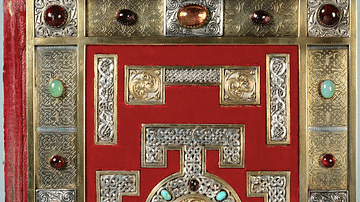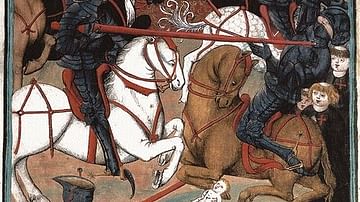Search
Did you mean: Shinto?
Search Results

Definition
Oshun
Oshun (pronounced O-shan, also given as Osun) is a supernatural entity recognized as both a spirit and a goddess in the Yoruba religion of West Africa. She presides over fertility, love, and freshwater, is the patroness of the Osun River...

Definition
Thomas Cromwell
Thomas Cromwell (l. c. 1485-1540 CE) served as chief minister to Henry VIII of England (r. 1509-1547 CE) from 1532 to 1540 CE. With his king and the Archbishop of Canterbury Thomas Cranmer (in office 1533-55 CE), Cromwell masterminded the...

Definition
Seshat
Seshat (also given as Sefkhet-Abwy and Seshet) is the Egyptian goddess of the written word. Her name literally means "female scribe" and she is regularly depicted as a woman wearing a leopard skin draped over her robe with a headdress of...

Definition
Kingdom of Northumbria
The Kingdom of Northumbria (c. 604-954 CE) was a political entity in the north of modern-day Britain with Mercia directly to the south, the Kingdoms of the Welsh to the west, and the land of the Picts to the north; the eastern line of the...

Definition
Huldrych Zwingli
Huldrych Zwingli (l. 1484-1531) was a Swiss priest who became the leader of the Protestant Reformation in the region at the same time Martin Luther (l. 1483-1546) was active in Germany. Zwingli is known as the 'third man of the Reformation'...

Definition
Saxon Wars
The Saxon Wars (772-804) were a series of conflicts between the Franks under Charlemagne, who sought to conquer Saxony and convert the populace to Christianity, and the Saxons who resisted. The conflict lasted over 30 years through 18 campaigns...

Definition
Lorenzo Ghiberti
Lorenzo Ghiberti (1378-1455 CE) was an Italian Renaissance sculptor and goldsmith whose most famous work is the gilded bronze doors of the Baptistery of Florence's cathedral. These doors, which took 27 years to complete, were so impressive...

Definition
Hussite Wars
The Hussite Wars (1419 to c. 1434) were a series of conflicts fought in Bohemia (modern-day Czech Republic) between followers of the reformer Jan Hus and Catholic loyalists toward the end of the Bohemian Reformation (c. 1380 to c. 1436...

Definition
Leon Battista Alberti
Leon Battista Alberti (1404-1472 CE) was an Italian scholar, architect, mathematician, and advocate of Renaissance humanism. Alberti famously wrote the treatise On Architecture where he outlines the key elements of classical architecture...

Definition
Ghosts in the Ancient World
A belief in an afterlife was central to every major civilization of the ancient world and this encouraged the recognition of the reality of ghosts as the spirits of the departed who, for one reason or another, either returned from the realm...